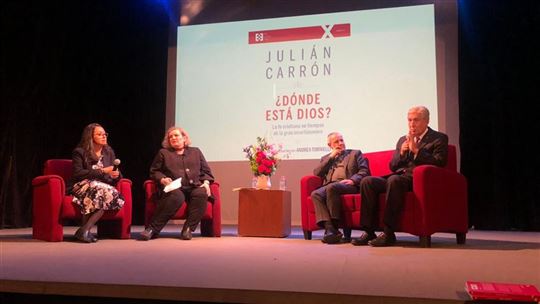
Mexico: Faith capable of embracing those who are different
In Monterrey, the presentation of the the Spanish edition of ‘Where is God?’ A dialogue between Julián Carrón, Inés Sáenz, David Noel Ramírez, and journalist Josefina Herrera.Where is God? This question challenges us in the midst of the circumstances that we are living in our city and in our country, especially in the face of the most painful situations of violence, inequality, stress, loneliness, which we see daily in the news and in our contingent reality."In this time of change, it is important to discover what is the role of your faith is, what is the role of every believer, in faithful response to Jesus Christ": this is the exhortation made by Archbishop Rogelio Cabrera López, president of the Mexican Episcopal Conference, through a video that invited the community to the presentation of the book.
On February 18, in Monterrey, this event brought together about two hundred people to learn more about the book Where is God?, a conversation between Julián Carrón and Andrea Tornielli. The book was presented by Carrón himself, who visited Monterrey for the first time, in a roundtable discussion with Inés Sáenz, dean of the School of Humanities at the Monterrey Institute of Technology (Tec), David Noel Ramírez, rector emeritus of Tec, and journalist Josefina Herrera, coordinator of the Enfoque Noticias newsletter.
"It is simple: if God does not exist, He cannot be present," a colleague told Josefina when she read the title of the book. In the news, we see our reality marked by violence, drug trafficking, feminicide, and missing persons. How can we find God in the midst of destroyed communities? This book invites us to rediscover faith from the awakening of consciousness, from reality, to answer the question in the first person.
"I agreed to present the book with some dread, because I do not usually read religious books, nor am I qualified on the subject. But the title caught my attention, because it is not a statement, but a question that I have begun to ask myself," said Inés Sáenz. "Today, we see young people leaving the Church because they do not find a witness. After reading this book, I understood that it is possible to move from a sacramentalist Church to a Church that lives the experience of God present, which bears witness to the joy that comes from living this experience", David Noel reflected. "If there is no experience, the Church is not interesting".
And how do we get to the point of living an experience? What can provoke our freedom so as to set us in motion? How can we see God and experience him if he appears invisible to us, like a ghost? Carrón introduced an analogy to begin to answer these questions. "Love is invisible and intangible, yet we know when love is there. We can see it in the faces of people in love and in their actions. In the same way, we can see God by encountering the intensity with which a person lives, looks, moves. God is invisible, but He became flesh: we meet Him when we see people who have changed, whose change cannot be explained by human reason.”
Just as there are no university courses that teach us how to fall in love, Christianity too cannot be inculcated, indoctrinated. We can only encounter Christianity, it simply happens, it is an event. He recalled the women who lived their faith starting from their femininity and who lived it within their relationship with reality, like Edith Stein who, while living in a concentration camp, defied all pain by living determined by the positive awareness of God's manifestation in nature.
Read also - New York Encounter 2020: “Crossing the Divide”
Encountering the experience of people like Edith and many others, who look at reality with different eyes, allows us to see that God is there, not because bad or painful things do not happen, but because that pain can be experienced in another way. Inés acknowledged that she was able to see it in the migrant shelters that have been opened in recent years, in Monterrey, by Christian communities. In these concrete examples in our city, we have seen how faith allows us to love the other, and to embrace those who are different. "What struck me most about the book was its proposal of a faith that is not restrictive, legalistic, corporate, but is an experience of openness towards the other, which embraces, which provokes action," Inés continued.
This book invites everyone, believers and non-believers alike, on a personal journey, to pause to rediscover the essence of faith which has often been reduced to mere discourse and ideologies. "The answer I have found is to continue on a human journey of faith here and now, encountering this presence of Christ. This provocation is a great challenge for me," Inés concluded.
The dialogue that began between the speakers on stage continued in the auditorium atrium, where the participants continued to share experiences and other questions that arise from this essential question for our lives.#WhereisGod?